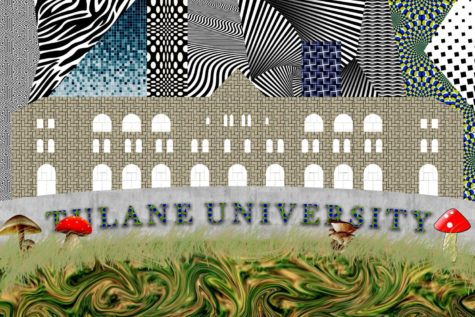OPINION | Psychedelic therapy speaker reflects wider cultural shift
October 27, 2021

On Nov. 12, New Orleans clinical psychologist Mark Skellie will speak at Tulane University about the current state of psychedelic-assisted therapy. The topic represents a sharp departure from academia’s reactionary attitude against research into psychedelic drugs. The stigma around studying hallucinogens, their effects on consciousness and their potential benefits ultimately stems from a series of unfortunate historical accidents.
In 1960, Harvard University professors Timothy Leary and Richard Albert established the Harvard Psilocybin Project. They intended to research how magic mushrooms, LSD and other hallucinogenic drugs affect consciousness and human behavior. Though their goals may have been worthwhile, Leary and Albert’s methods posed great risk to participants.
The two often conducted studies while they were under the influence of the substances themselves and encouraged drug experimentation among undergraduate students. By 1963, their irresponsible behavior led to both men’s dismissal and the end of the project.
Leary went on to advocate for psychedelic drug use at large gatherings, television debates and even the U.S. Senate. Albert also heavily involved himself in psychedelic advocacy, co-authoring the books “The Psychedelic Experience” with Leary and “LSD” with other advocates.
Later in the 1960s, the growing movement of young Americans seeking to explore their minds through hallucinogenic drugs became entangled with other spheres of the ongoing counterculture.
The civil rights, anti-war and sexual liberation movements all heavily intersected with psychedelic experimentation and advocacy. Illicit substances became a prime target of the Nixon Administration, which hoped to sway public opinion against widespread anti-establishment movements.
In June of 1971, President Richard Nixon declared drugs “public enemy number one” and began efforts to systematically shut down research and recreational use of marijuana and psychedelics.
Since then, academic investigations into psychedelic substances took a long hiatus. Though underground research and experimentation continued, the idea of exploring the benefits and effects of hallucinogens remained greatly stigmatized among established universities.
That is until 2006, when Johns Hopkins University published a “landmark” study on the long-term positive effects of psilocybin, the active ingredient in magic mushrooms. When administered under the supervision and guidance of medical professionals, 79% of subjects reported moderate or substantial increases in life satisfaction two months after a single psilocybin trip.
Follow-up publications from Johns Hopkins indicate that psychedelic trips could have significant potential in breaking addiction and lifting depression.
Despite promising research from such a prestigious university, psychedelic research has continued to be pushed aside in academic circles for years. Only recently have cultural winds begun to shift. Coinciding with renewed coverage in media, popular podcasts, Netflix documentaries and bestselling books, academic institutions have launched their own programs focused on mind-altering drugs.
The colleges of University of California at Berkeley and University of Wisconsin-Madison recently established their own centers for psychedelic science while discussion groups have popped up in other schools across the country.
Renewed interest in research has now trickled down to Tulane University, where the Cognitive Studies in the Community talk series is to host Skellie. In his talk, titled “Psychedelic-Assisted Therapy: What You Need to Know,” Skellie will share his expertise on psychotherapy aided by MDMA and psilocybin.
Such a talk taking place at a school in the Deep South could not have occurred even a decade ago. This represents a much larger shift in cultural attitudes around the potential of these drugs.
Daniel Burnston, director of the talk series, credits the historical politicization of psychedelics to “the lack of real societal understanding of what these substances were.” This caused them to be “over sensationalized by their proponents and to be over demonized by their opponents.”
The talk intends to educate students on psychedelic-assisted psychotherapy in a scientific manner, unlike the substances’ historic advocates and detractors.
It is imperative that researchers follow proper methodology to distinguish their findings from the discredited Harvard Psilocybin Project. However, we should not be too quick to discount the value many have derived from psychedelic drugs outside of approved Western science.
Whether through Ayahuasca ceremonies in South America or peyote rituals in indigenous North American communities, other cultures have been using psychedelic substances to achieve spiritual and personal fulfillment for hundreds of years. Academic institutions should continue to invite discussion surrounding psychedelics and work to destigmatize research into their beneficial possibilities.









Leave a Comment